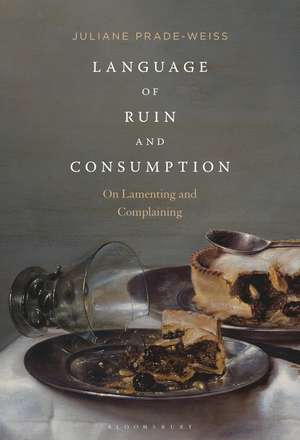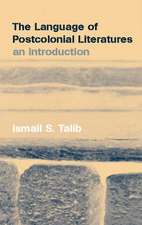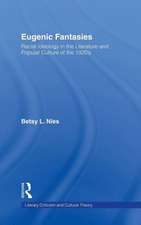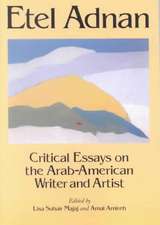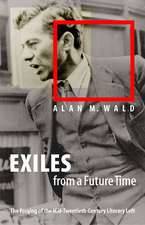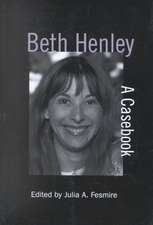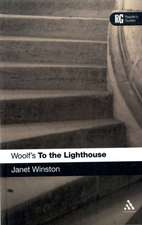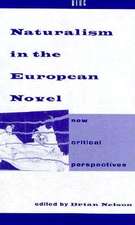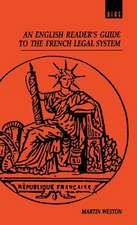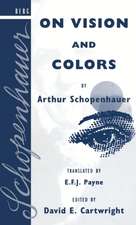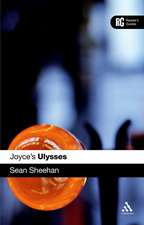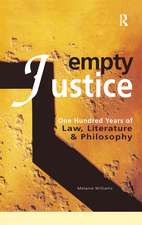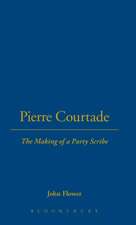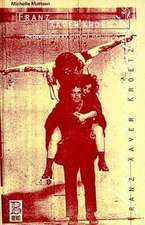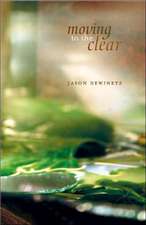Language of Ruin and Consumption: On Lamenting and Complaining
Autor Dr Juliane Prade-Weissen Limba Engleză Hardback – 5 aug 2020
| Toate formatele și edițiile | Preț | Express |
|---|---|---|
| Paperback (1) | 198.85 lei 6-8 săpt. | |
| Bloomsbury Publishing – 23 feb 2022 | 198.85 lei 6-8 săpt. | |
| Hardback (1) | 657.54 lei 6-8 săpt. | |
| Bloomsbury Publishing – 5 aug 2020 | 657.54 lei 6-8 săpt. |
Preț: 657.54 lei
Preț vechi: 943.73 lei
-30% Nou
Puncte Express: 986
Preț estimativ în valută:
125.82€ • 131.36$ • 104.13£
125.82€ • 131.36$ • 104.13£
Carte tipărită la comandă
Livrare economică 04-18 aprilie
Preluare comenzi: 021 569.72.76
Specificații
ISBN-13: 9781501344190
ISBN-10: 1501344196
Pagini: 296
Dimensiuni: 152 x 229 mm
Greutate: 0.56 kg
Editura: Bloomsbury Publishing
Colecția Bloomsbury Academic
Locul publicării:New York, United States
ISBN-10: 1501344196
Pagini: 296
Dimensiuni: 152 x 229 mm
Greutate: 0.56 kg
Editura: Bloomsbury Publishing
Colecția Bloomsbury Academic
Locul publicării:New York, United States
Caracteristici
Links psychoanalysis, literary criticism, philosophy, anthropology, and religious studies to tackle an issue as relevant in theory as in everyday life and political discourse
Notă biografică
Juliane Prade-Weiss is Professor of Comparative Literature at Ludwig Maximilian University Munich, Germany. She is editor of (M)Other Tongues: Literary Reflexions on a Difficult Distinction (2013).
Cuprins
AcknowledgementsList of AbbreviationsIntroduction: Getting a HearingConsuming Structures of LanguageLamenting in TheoryTerms of PlaintThe Coming Chapters1. Understanding Plaintive Language: FreudComplaint without a Cause: Treating Hysteria and Forgetting Laments in ModernityComplaining and Wish-FulfillmentIdiom of Plaint: The "Wolf Man's" SpeechMourning, Melancholia, and ConsumptionMetabolism of Plaintive Language 2. Ritual and Modernity: On Silencing Laments (with Aeschylus, Rilke, and Veteranyi)Tale of Lament's Life and DeathPatterns of Looking at Ritual Plaints"The Dead Are Hungry": Metaphor and LiminalityAntiphony: Response and DissentTa(l)king Revenge: No End to Lamentation3. Voicing Pain and Destruction: Wittgenstein and ScholemNaming and Claiming PainKnowing and Doubting PainComplaint by ResponseA Nasty Move: Silencing PlaintsRelationality and SymbolLamenting Tradition4. Lament of Nature: Benjamin, with HerderTrauerspiel and Tragedy: "the ear for lament"Benjamin's "Nature"Language as Such, and Terminology: Looking AwayVanishing from HistoryLament and Theory, Once Again5. (No Way) From Complaining to Legal Action: Kafka"with every complaint understanding [subsides]"Understanding, Comprehension, Sympathy, and InconsolabilityComplaints, Vanishing into Juridical ActionRepresentation and BetrayalPolitics of Outcry: Claiming JusticeConclusion: Transgenerational Trauma and the Inability to LamentBibliographyIndex
Recenzii
Juliane's equally groundbreaking and fascinating study on Lamenting and Complaining explores a form of language that is just as fundamental and counter-structural to society's functional forms of communication as the rhetorics of all-consuming love and passion. This is undoubtedly a landmark study of a highly disturbing and paradoxical type of discourse that seeks to communicate one thing above all: the failure of communication itself.
Language of Ruin and Consumption is a nuanced and elegantly written book on a fundamental yet often overlooked feature of human language: wanting to be heard. As Prade-Weiss shows, this simple yet evocative fact of our language use has tended to languish on the margins of all the major theories of symbolization, communication, and expression: the structure that registers this want, the lament, cannot contain its own remedy, only dispatch a call with no addressee. Yet plaintive language also therefore outlines the chance to articulate that which is not annulled at the outset by an answer. Tracking the vocation of complaint from Aristotle to psychoanalysis, from classical tragedy through Rilke and Wittgenstein to Scholem, Benjamin and Kafka, this rich and suggestive book makes us rethink our most recent preoccupations with protest, public mourning, and reconciliation, and in the process uncovers grounds for registering our traumata for the future.
In this encyclopedic book, 'Klagen,' lament/complaint, speaks for itself at last. Pursuing the phenomenon across a huge set of languages and disciplines, Prade-Weiss discovers the weakness of all expressive models. They assimilate lament to speech. It is not a special kind of speech, whether for a psychological state or an ethical injury or a social tragedy. Lament is rather a paradigmatic moment of non-expression. Nothing is expressed in it, and this nothing makes a historical indigestion audible. Whether it appears as silence, wailing, inarticulate grunts, or other repetitions antagonistic to meaning, lament/complaint happens at a limit of language and gestures toward a trauma without words to speak for it in the dominant language.
Language of Ruin and Consumption is a nuanced and elegantly written book on a fundamental yet often overlooked feature of human language: wanting to be heard. As Prade-Weiss shows, this simple yet evocative fact of our language use has tended to languish on the margins of all the major theories of symbolization, communication, and expression: the structure that registers this want, the lament, cannot contain its own remedy, only dispatch a call with no addressee. Yet plaintive language also therefore outlines the chance to articulate that which is not annulled at the outset by an answer. Tracking the vocation of complaint from Aristotle to psychoanalysis, from classical tragedy through Rilke and Wittgenstein to Scholem, Benjamin and Kafka, this rich and suggestive book makes us rethink our most recent preoccupations with protest, public mourning, and reconciliation, and in the process uncovers grounds for registering our traumata for the future.
In this encyclopedic book, 'Klagen,' lament/complaint, speaks for itself at last. Pursuing the phenomenon across a huge set of languages and disciplines, Prade-Weiss discovers the weakness of all expressive models. They assimilate lament to speech. It is not a special kind of speech, whether for a psychological state or an ethical injury or a social tragedy. Lament is rather a paradigmatic moment of non-expression. Nothing is expressed in it, and this nothing makes a historical indigestion audible. Whether it appears as silence, wailing, inarticulate grunts, or other repetitions antagonistic to meaning, lament/complaint happens at a limit of language and gestures toward a trauma without words to speak for it in the dominant language.
